Have you ever wondered which country is the cleanest in the world? At Remitly, we know that our customers are curious travellers, and cleanliness isn’t just about appearances; it’s closely linked to public health, quality of life, and even national pride.
Around the globe, some countries have earned a reputation for tidiness thanks to a mix of cultural habits, strong government policies, and active community involvement. In this article, we’ll explore some of the top contenders for the title of “world’s tidiest country” and uncover what makes them stand out.
How is “tidiness” measured?
If you think back to what your bedroom looked like as a teenager, you’d probably agree that “tidy” can be subjective. The same is true on a global scale. There’s no single way to decide the tidiest country, and there’s certainly no official title or award for this honour. Instead, tidiness can be assessed through a mix of measurable indicators and cultural influences. Below are some of the key factors that contribute to how clean and well-organised a country appears.
The Environmental Performance Index (EPI)
The Environmental Performance Index or EPI is a measurement scale developed by Yale University that ranks countries on environmental health and ecosystem vitality. The EPI includes metrics such as sanitation and waste management, both of which play a crucial role in assessing national cleanliness.
Public cleanliness and sanitation
Access to clean water and effective waste disposal systems are key indicators of a country’s “tidiness.” These factors have been considered when selecting the countries featured in this article.
Cultural norms
Because tidiness is subjective, it’s often influenced by the societal values and daily habits of individual citizens. Is it acceptable to drop a cigarette butt on the ground? Can you spit your gum onto the footpath? The answers to these questions will vary from culture to culture and have an impact on overall cleanliness.
Top contender: Japan
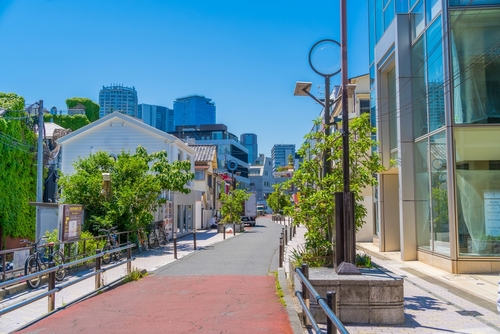
One of the top contenders for the tidiest country in the world is Japan. Travelling there quickly reveals why: it’s a leading example of how cultural values, community spirit, and efficient systems can combine to create a world-renowned reputation for cleanliness.
Cultural habits
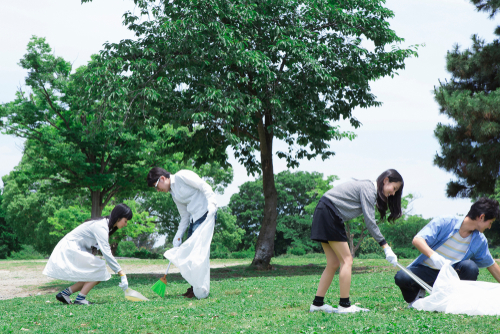
One of the main contributors to Japan’s tidiness is the cultural habits that are instilled in people from a young age. The Japanese follow a concept that they refer to as o-soji, which plays out in two different contexts.
The first is “student cleaning”, a norm in Japanese schools. It’s believed that cleaning helps teach students teamwork, respect for shared spaces, responsibility, and a sense of ownership over their environment.
Each day, students spend dedicated time cleaning classrooms, hallways, and bathrooms. In fact, students themselves are responsible for all of the daily cleaning tasks. Janitors in Japanese schools are more like “groundskeepers,” responsible for deep cleaning and maintenance.
The second context of o-soji is the end-of-year cleaning ritual. This “big cleanup” is a long-standing tradition that symbolises clearing out old energy and making space for a fresh start in the new year. People deep clean their homes, offices, and public spaces, often working from top to bottom and inside to out.
Community involvement

The Japanese tradition of linking cleanliness to responsibility and well-being extends into modern life and global culture. The Japanese World Cup football team famously went viral for leaving their locker room spotless, and world-renowned organising consultant and bestselling author Marie Kondo has brought Japan’s tidy philosophy to homes worldwide.
On a local level, community involvement in Japan is just as strong. Neighbourhoods routinely organise clean-ups of shared or public spaces, and it’s common to see residents tidying streets, parks, or front areas of shops and homes.
Efficient systems
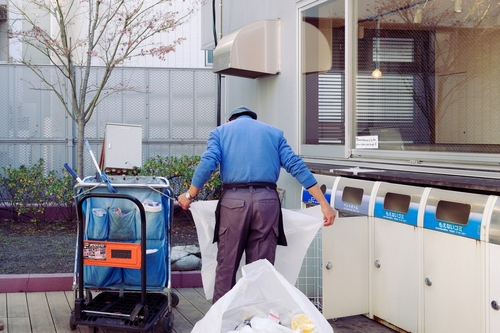
Japan also boasts highly organised waste management and recycling systems, which play a major role in maintaining its overall tidiness. This infographic from Go! Go! Nihon highlights just how focused Japan is on sorting and managing waste efficiently.
Other remarkably tidy countries
Although Japan sets the bar very high, other countries are also well known for their cleanliness. Here are some of the other top contenders for the title of the world’s tidiest country.
Singapore
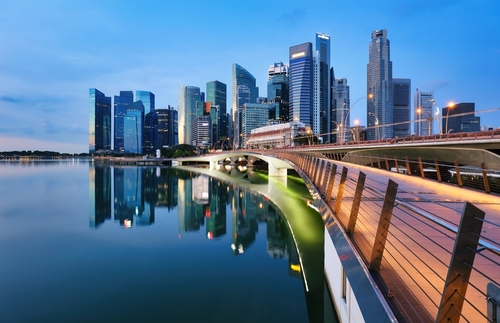
Singapore is famous for having strict legislation that promotes cleanliness. Often, these regulations catch out unsuspecting tourists who aren’t familiar with the laws. For example, chewing gum is illegal in Singapore!
These laws and regulations help to uphold Singapore’s reputation and nickname, “The Fine City.” They ban untidy habits like littering and spitting, reinforcing the idea that cleanliness is everyone’s responsibility. Over time, the government’s strong stance on hygiene and cleanliness has helped make tidiness a core part of Singapore’s national identity.
Rwanda
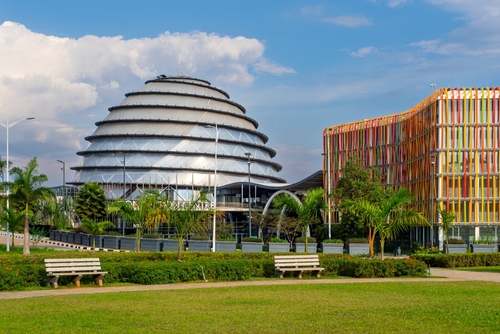
In Rwanda, there’s a mandatory national community clean-up day held on the last Saturday of every month, and it is known as Umuganda. This long-standing tradition has helped transform the capital, Kigali, into one of Africa’s cleanest cities.
A young Rwandan named Jean Luc has fond memories of Umuganda, which was started in 1974 and reintroduced after an absence in 1998 for all Rwandan citizens ages 18 to 65. Luc says, “I would always eavesdrop on my parents whenever they came back from it. It always seemed like something that brightened their Saturdays.”
Switzerland

If you picture pristine natural environments and spotless cities, Switzerland likely comes to mind. In order to preserve its beautiful natural environments, the country enforces strict recycling rules and clear expectations around waste management.
For those moving to Switzerland, it’s worth noting the strong social expectation to maintain order and cleanliness in all public areas. This mindset is backed by government spending, with Switzerland spending a significant amount of funds on sanitation services and equipment to ensure its cities and natural spaces remain immaculate.
What can we learn from the world’s tidiest countries?
Cleanliness is more than just a good reason to visit a country. It can also teach us a lot about that nation’s culture, community, and government. The world’s tidiest countries share a few key qualities that others can learn from and adopt in their own ways.
Strong community spirit
In all of the countries where cleanliness is a priority, there’s strong community involvement and support. Tidiness is seen as a shared responsibility, and citizens often hold each other accountable through cleaning traditions or organised community cleaning days. It’s not just the government’s job to keep these countries clean; citizens see it as their personal responsibility too.
Education is key
The cleanest countries in the world recognise that teaching children about tidiness early on creates lifelong habits and is an investment in the nation’s future. From Japanese students being responsible for cleaning their own learning spaces to young Singaporeans being taught that spitting is unacceptable behaviour, these societies focus on passing down cleanliness and respect for shared spaces from one generation to the next.
Clear policies and systems
In order to support national tidiness, the cleanest countries tend to have policies and systems that reinforce these values. Effective waste management, strong recycling programs, and well-enforced anti-littering laws are all essential to maintaining a clean environment.
How to support tidiness in your own life
Cleanliness doesn’t just happen on its own; it starts with small, everyday actions. Whether you’re at home, travelling, or settling into a new country, there are a few simple ways to make a positive difference. By taking inspiration from the world’s tidiest nations, you can help create cleaner, healthier spaces wherever you go.
In your home community
If you’re looking for ways to keep your own community tidy, consider the following ideas:
- Join or organise community clean-up days
- Learn about local laws that support cleanliness and hold yourself accountable to them
- Try activities like plogging—picking up trash while jogging or walking
- Support politicians and initiatives that prioritise environmental protection
As a traveller or tourist
If you’re traveling to a new country, keep an open mind. Spend some time learning why a country is as tidy as it is. Try to understand the long-standing reputation of countries like Singapore and Switzerland, or challenge stereotypes of countries that are not considered tidy.
There are plenty of aspects that contribute to a country’s cleanliness, from cultural expectations, government policies, a country’s GDP, and education systems. Understanding these factors can help you be a more respectful and responsible visitor.
If you’ve immigrated to a foreign country
If you’ve recently moved abroad, it’s worth remembering that many habits and responsibilities related to cleanliness are woven into a country’s cultural identity. Understanding local expectations around tidiness can be a significant part of settling into your new home. Think of these customs as cultural touchpoints that are just as important as a country’s language, traditions, and holidays.
Tidiness takeaways
If there were an official title for cleanest country in the world, Japan might take home the trophy, but that wouldn’t be without strong competition from Singapore, Rwanda, and Switzerland. All of these nations show how communities, cultures, traditions, and governments can work together to make tidiness a priority.
When we think of cleanliness as the result of government action, cultural values, and individual responsibility, it becomes as clear as a pristine Swiss lake that everyone can play a part in making their own community a cleaner, tidier place.
FAQs
What is the tidiest country in the world?
That depends on how you define “tidy.” There’s no official title, but Japan is widely regarded as one of the tidiest countries in the world thanks to its cultural emphasis on cleanliness, community clean-up practices, and highly efficient waste management systems.
Which city is considered the cleanest in the world?
Kigali, the capital of Rwanda, is often cited as one of the cleanest cities in the world, largely thanks to a nationwide community clean-up program called Umuganda and a ban on plastic bags.
How does the Environmental Performance Index (EPI) relate to cleanliness?
The EPI ranks countries based on environmental health, including metrics for sanitation, access to clean drinking water, and waste management. Countries that score highly, like Switzerland and other Nordic nations, typically have excellent systems in place to ensure public cleanliness.